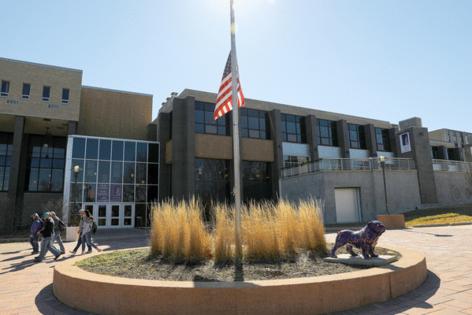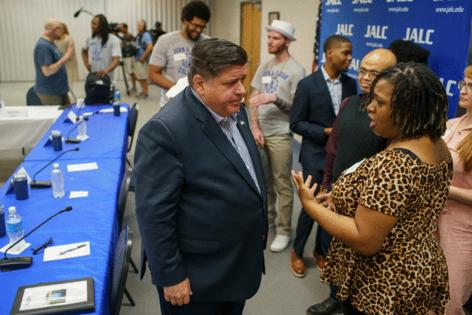Illinois Gov. JB Pritzker's push to allow community colleges to offer 4-year degrees faces uphill climb in Springfield
Published in News & Features
CHICAGO — Monica Mendoza started working on her early childhood education about a decade ago with the dream of opening a day care in her home.
After breaks due to the pandemic and the birth of her third and fourth child, Mendoza, now 38, said she is on track to earn her associate’s degree from Oakton College in May.
She also wants to earn a bachelor’s degree to go beyond working as a teacher’s assistant, but she’s concerned about the financial and logistical commitments of going to a university farther away from her home in Evanston, she said. Those factors will determine “where and if I 100% will transfer,” she added.
Because she thinks it could help students like her to complete their education without being so stretched financially and otherwise, Mendoza is advocating for a proposal from Gov. JB Pritzker that would allow some community colleges to offer four-year degrees. It would allow students like her to earn a bachelor’s degree from their community college, rather than having to transfer.
The governor’s office and proponents from Illinois’ community colleges say the proposal would allow more Illinoisans to access degrees in fields that could use more workers, such as nursing and cybersecurity.
But the pitch is facing stiff headwinds in Springfield, where earlier this month it failed to be called for a committee vote ahead of a procedural deadline amid opposition from existing four-year institutions, some of which are facing enrollment and financial issues.
Pritzker, who highlighted the plan in his budget announcement in February, and has been promoting it at stops around the state for the past several weeks, said he still has hope the bill could pass.
“It could be done. There is plenty of time left for us to get it done in this General Assembly,” Pritzker said after the bill failed to be called for an expected committee vote. “It’s very important to me to expand educational opportunities and to help industries fill the open positions that they have.”
Similar legislation has stalled in the General Assembly in the past, though two dozen states already offer authorization for bachelor’s degrees at community colleges, according to a tally from the Community College Baccalaureate Association.
The proposal also comes amid a time of overall anxiety in higher education, as the administration of President Donald Trump has moved to dismantle the U.S. Department of Education and potentially drastically cut funding that states rely on. Pritzker’s administration has touted its initiatives as a foil to Trump’s threats to public education.
“We have some really terrific four-year institutions in Illinois that are a vital part of our higher education system, but we need to recognize that there are geographic, financial and accessibility constraints that close off too many students from attending those schools, especially in rural areas,” Pritzker said earlier this month while promoting the legislation at Lewis and Clark Community College in downstate Godfrey.
If a community college board chooses to offer a bachelor’s degree program, it would need to meet a series of requirements outlined in the law and be approved by the Illinois Community College Board and Illinois Board of Higher Education, according to the bill.
Four-year universities argue the bill could diminish progress the state has made on educational access and achievement, according to a statement to reporters from a coalition of Illinois universities including leadership from Chicago State University, Illinois State University and several “directional” Illinois schools such as Northern Illinois University.
The president of the Federation of Independent Illinois Colleges and Universities, which includes private schools such as Northwestern University, the University of Chicago and DePaul University, also signed off on the release.
The statement, which did not include the University of Illinois system, raised concerns that the proposal could be “duplicating efforts” to offer certain programs or raise costs.
But some students like Madison Albert, who’s set to graduate with an associate’s degree this year from Lewis and Clark, don’t see transferring to a four-year university as a viable option, even while understanding the benefits of having a bachelor’s degree.
“If I don’t have the means to commute or the funds, that means that I then am just out of luck when it comes to continuing my education?” she asked in an interview. Instead, she said she’ll likely stick with an associate’s degree, despite knowing that it won’t make her as competitive for hiring opportunities.
Fuad Hassan, a mechanical engineering student at the University of Illinois Chicago from Gurnee who backs the proposal, is trying to earn a four-year degree on a tight budget, and spends as much time commuting as some college kids do working a part-time job.
Hassan started his college education at the College of Lake County in nearby Grayslake. Now, he struggles to study or catch a nap during a nearly five-hour Metra commute, four days a week.
“After that, for a long period of the day, I feel really tired and it’s really hard to focus on the studies,” Hassan said, adding: “I can work hard. I can commute every day. But comparing the dorm cost and food cost, living in Chicago … it’s cheaper to stay with my parents.”
Illinois community colleges saw a record-breaking surge in enrollment this spring semester, according to the Illinois Community College Board’s most recent enrollment report, even as some four-year universities have struggled.
“The pandemic had a profound effect on enrollment and Illinois community colleges continue to aggressively recruit and retain students as enrollment rebounds,” the report said, adding that the state “is outpacing growth nationally.”
Four-year universities have warned of dwindling enrollment that could worsen with demographic changes. While fall enrollment at Illinois public universities grew by 1.6% this school year, half of the 12 schools tracked saw a drop-off, according to a report from the Illinois Board of Higher Education, which supports the legislation.
The greatest of those decreases was at Western Illinois University, which saw a more than 10% change in year-over-year enrollment. The school made local headlines last year as dozens of faculty and staff were laid off amid that university’s enrollment and financial issues.
The governor’s proposal includes some guardrails against siphoning off students from their local universities, according to its proponents. It says community college boards must be able to demonstrate the programs wouldn’t “unnecessarily duplicate” already-available four-year offerings in the same district, though few specifics are outlined in the bill’s text.
The intent is to fill workforce gaps in local communities and help students who otherwise wouldn’t get a four-year degree, said Jim Reed Jr., executive director at the Illinois Community College Trustees Association.
Some fields found to have workforce needs that could be met by the proposal include cybersecurity and manufacturing with automotive technicians and quality control roles, Reed said. Many students expected to participate would be considered “nontraditional,” older students, he added.
The change wouldn’t directly cost the state, he said, and the cost for students’ third and fourth years would be capped at 150% of the community college’s typical tuition, according to the bill.
While the governor has focused on rural communities in advocating for the legislation, the bill’s current text suggests any community college in Illinois could potentially be eligible if they can show the need and demand for a program. A spokesperson at the City Colleges of Chicago declined a request for comment.
Negotiations on the bill continue. State Rep. Tracy Katz Muhl, the bill’s House sponsor, said that the discussions include “setting up a framework for how these programs are going to run throughout the state,” including keeping the door open for regional differences in how issues like commute times are calculated, for example.
The state could provide “rubrics” or otherwise more clearly show how it would make decisions about whether offerings are duplicative to provide more certainty to different regions about what programs might be likely to develop, she said.
“Everybody cares about getting this right,” Katz Muhl said.
A proposal to allow community colleges to offer nursing degrees, led by now-Deputy Gov. Andy Manar, failed in 2017. Manar, then a state senator, at the time accused public universities of lying in their testimony and failing to negotiate provisions of the bill.
Reed and others also testified in favor of legislation like this year’s proposal at a state Senate subject matter hearing last year, but it was never called for a vote. At that hearing, some lawmakers raised concerns about increased costs in tuition or taxes to pay for the change.
Mendoza, the Oakton College student, may soon be starting a different kind of educational journey: Her oldest daughter, a 16-year-old at Evanston Township High School, is starting a college search of her own, starting to dream about schools while also beginning to look at grants and scholarships, Mendoza said.
It’s a milestone opportunity but also adds to the family’s list of potential higher education costs, she said.
“We all love for her to spread her wings and just do what she wants,” Mendoza said. “It’s kind of difficult when I’m also pursuing a career.”
----------
Tribune reporter Jeremy Gorner contributed to this report from Peoria.
____
©2025 Chicago Tribune. Visit at chicagotribune.com. Distributed by Tribune Content Agency, LLC.










Comments